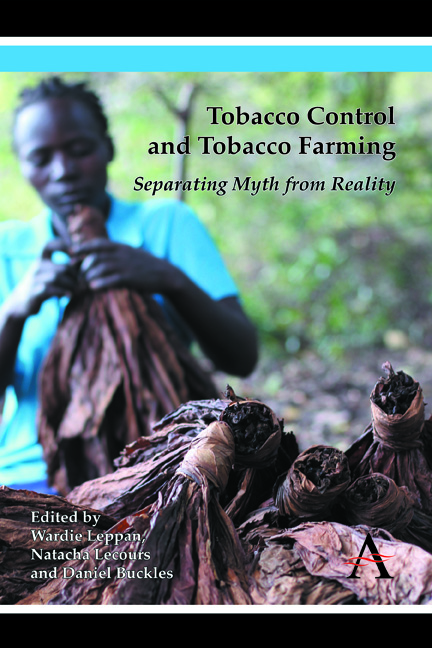Book contents
- Frontmatter
- Contents
- List of Figures, Tables and Photographs
- Foreword
- Preface
- Introduction: Separating Myth from Reality
- Section One The Determinants of Tobacco Leaf Demand
- Section Two Tobacco-Farming Conditions in Low- and Middle-Income Countries
- Section Three Economically Sustainable Alternatives to Tobacco
- Conclusion: Reframing the Debate on Tobacco Control and Tobacco Farming
- Annex: A Policy Brief on Tobacco Control and Tobacco Farming
- Contributors
Conclusion: Reframing the Debate on Tobacco Control and Tobacco Farming
Published online by Cambridge University Press: 05 November 2014
- Frontmatter
- Contents
- List of Figures, Tables and Photographs
- Foreword
- Preface
- Introduction: Separating Myth from Reality
- Section One The Determinants of Tobacco Leaf Demand
- Section Two Tobacco-Farming Conditions in Low- and Middle-Income Countries
- Section Three Economically Sustainable Alternatives to Tobacco
- Conclusion: Reframing the Debate on Tobacco Control and Tobacco Farming
- Annex: A Policy Brief on Tobacco Control and Tobacco Farming
- Contributors
Summary
Introduction
From a public health perspective the case for tobacco control is compelling. Policies to reduce tobacco use have been successfully implemented in many contexts, leading to improved health outcomes for all segments of society (Centers for Disease Control and Prevention 2007; Glantz and Gonzalez 2011; Drope 2011). The fiscal health of national economies is also positively affected by reducing the prevalence of domestic tobacco use. While the size of the net benefit to the economy depends on a variety of domestic factors (Warner 2000), there is no doubt that it is positive at present and only going to grow more positive over time as populations and the economic costs of tobacco-related disease and death increase. Policies aimed at reducing the prevalence of tobacco use (taxation, smoking bans, education, etc.) also bring net economic benefits to individual users of tobacco products and the broader economy as expenditures shift to productive uses (Roy et al. 2012; Jha and Chaloupka 1999; Warner et al. 1996; Townsend et al. 1994). These gains in knowledge and practice are encouraging, and have led some tobacco-control experts to begin to treat the idea of ending the tobacco epidemic as an attainable goal.
Despite the unarguable merits of tobacco control, implementation of the Framework Convention on Tobacco Control (FCTC) is only just beginning in many countries.
- Type
- Chapter
- Information
- Tobacco Control and Tobacco FarmingSeparating Myth from Reality, pp. 247 - 270Publisher: Anthem PressPrint publication year: 2014



